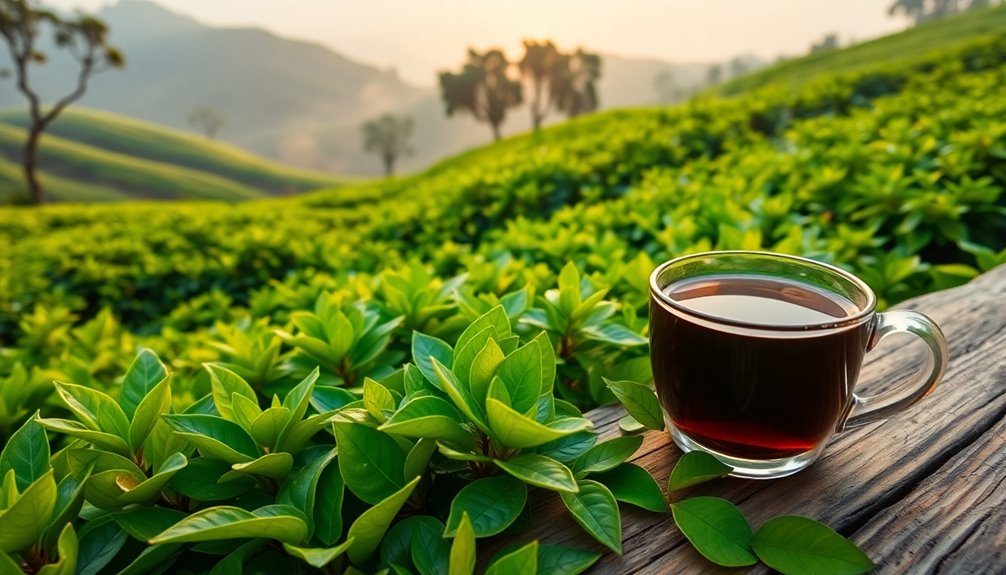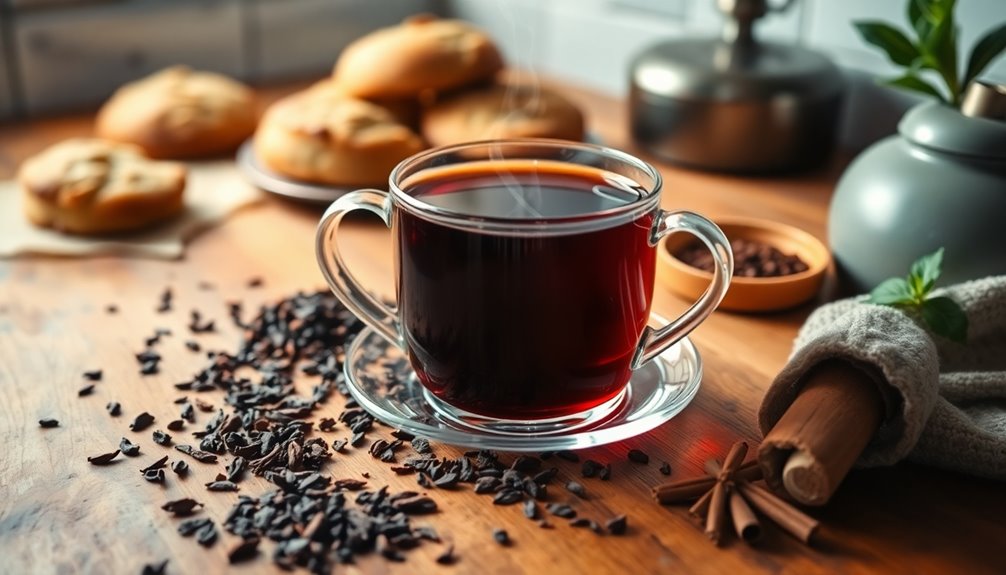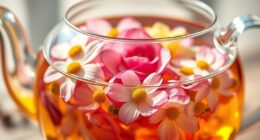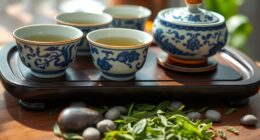Black tea stands out for its bold flavor and higher caffeine content, making it more invigorating than green, white, or herbal options. While green and white teas are milder with higher antioxidants like catechins, herbal teas often lack caffeine and offer soothing benefits. The oxidation process gives each tea its unique taste and health profile. Exploring these differences further reveals how each type can suit different preferences and wellness goals.
Key Takeaways
- Black tea undergoes full oxidation, resulting in a stronger flavor and higher caffeine content compared to green, white, and herbal teas.
- Its rich flavonoid antioxidants differ from the catechins in green tea, influencing specific health benefits.
- Brewing black tea for 3-5 minutes maximizes flavor and nutrient extraction, similar to other teas but with a more robust taste.
- Herbal teas lack caffeine and oxidation, offering different health perks like soothing properties without stimulants.
- The oxidation process defines each tea’s flavor profile and health benefits, making black tea distinct from less oxidized and herbal varieties.

Have you ever wondered how black tea stacks up against other types of tea? When you’re exploring your options for a warm, comforting beverage, understanding the differences can help you make better choices. Black tea is known for its robust flavor and higher caffeine content, but it’s also important to weigh how its tea brewing process influences its health benefits. Black tea undergoes a full oxidation process, which gives it its dark color and strong taste. This process also affects the antioxidants present in the tea, often resulting in a different profile compared to green or white teas. When you brew black tea, you typically steep it in hot water for about 3 to 5 minutes, which helps extract its rich flavors and beneficial compounds. The tea brewing method is essential because it determines how much of these compounds you get in your cup. Proper brewing maximizes the health benefits, such as improved heart health, better digestion, and potential anti-inflammatory effects. Black tea contains flavonoids, which are powerful antioxidants that can help reduce the risk of chronic illnesses. Many studies suggest that regularly drinking black tea may lower blood pressure and improve cholesterol levels, contributing to overall cardiovascular wellness. Compared to green or herbal teas, black tea’s antioxidant levels might be slightly lower, but it compensates with a stronger, more invigorating flavor that many people find appealing. The caffeine in black tea also makes it a popular choice for boosting alertness and focus, especially in the morning or during an afternoon slump. Beyond its stimulating effects, black tea’s health benefits are enhanced when you pay attention to how you brew it, ensuring that you extract the maximum nutrients without overdoing the steeping time, which can make the tea bitter. When you compare black tea to other varieties, you’ll notice differences not only in flavor and caffeine but also in the specific health benefits each offers. Green tea, for example, is rich in catechins, which have their own set of health perks, while herbal teas often provide unique antioxidants and soothing properties without caffeine. Additionally, tea oxidation plays a crucial role in defining the flavor and health profile of different teas, including black tea. Ultimately, the choice depends on your taste preferences and health goals, but understanding the role of tea brewing techniques helps you get the most out of your black tea experience. Whether you’re aiming for a health boost or simply a flavorful drink, black tea holds its own among other teas, offering a balanced mix of taste, energy, and wellness benefits that can easily become a daily ritual.
Frequently Asked Questions
How Does Black Tea Affect Sleep Quality Compared to Other Teas?
Black tea can impact your sleep quality more than other teas because of its caffeine content. The caffeine impact may cause sleep disruption if you drink it too close to bedtime. Unlike herbal teas, black tea contains higher caffeine levels, which can make it harder for you to fall asleep and stay asleep. To improve your sleep, consider avoiding black tea in the hours before you plan to rest.
Are There Specific Health Benefits Unique to Black Tea?
You gain unique health benefits from black tea, especially its antioxidant properties that help protect your cells from damage. Regular consumption may also support your heart health by improving cholesterol levels and reducing blood pressure. These benefits are specific to black tea due to its high concentration of flavonoids. Including black tea in your diet can boost your overall health, making it a valuable addition to your daily routine.
Which Teas Have the Highest Caffeine Content?
If you’re looking for the teas with the highest caffeine content, you’ll find that matcha and yerba mate top the list. Matcha, a powdered green tea, has a caffeine concentration of about 70 milligrams per cup, while yerba mate can reach up to 85 milligrams. These tea varieties give you a strong energy boost, making them ideal if you’re seeking a more potent caffeine kick than most black or traditional green teas.
Can Black Tea Be Used in Cooking or Baking Recipes?
Yes, you can use black tea in cooking and baking. It adds depth and flavor to tea-infused desserts like cakes, cookies, and puddings. You can also incorporate it into savory black tea recipes, such as marinades, sauces, or risottos, to bring a rich, smoky note. Brew the tea strong, then use it as a liquid ingredient for a unique twist. Experimenting with black tea enhances both sweet and savory dishes.
How Should Black Tea Be Stored to Maintain Freshness?
Think of black tea as a delicate song that needs the right environment to stay vibrant. To preserve its freshness, store it in an airtight container away from light, heat, and moisture—like tucking it into a cozy, dark closet. Keep it in a cool, dry place, and avoid frequent opening to prevent air exposure. These storage techniques help maintain its flavor, aroma, and freshness for a longer, more enjoyable brew.
Conclusion
Think of teas as different travelers on a journey. Black tea, with its bold, robust flavor, is like a seasoned explorer ready to energize your day. Other teas, like green or herbal, are gentle guides offering calm or clarity. No matter which path you choose, each tea’s unique qualities lead you to a better understanding of your taste and mood. Embrace the journey, and let each cup be a new adventure on your palate.










